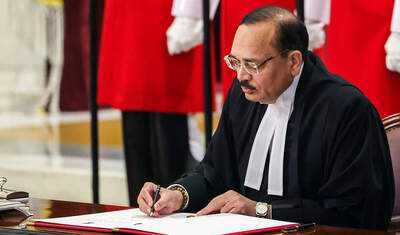
Today marked a pivotal moment in the Indian judiciary as Justice Surya Kant took the oath of office as the 53rd Chief Justice of India (CJI). The oath was administered by President Droupadi Murmu, with the presence of the Prime Minister, central ministers, and various senior constitutional officials. Following the traditional seniority principle, he has been entrusted with this crucial role, which is expected to last approximately 14 to 15 months. During this period, significant strides in judicial reforms and the reduction of pending cases are anticipated.
The position of Chief Justice in India extends beyond mere administrative authority; it embodies the constitutional heart of Indian democracy. With Justice Surya Kant assuming this role, there are high expectations and even greater challenges ahead. He is recognized for his profound constitutional insights, having made decisions on complex issues and constitutional disputes that uphold democratic values. His elevation to this top judicial position signals a crucial moment for both the judiciary and society.
One of the most pressing challenges facing the Indian judiciary is the alarming rise in pending cases, with millions still awaiting resolution. This issue has reached critical levels in the Supreme Court, High Courts, and lower courts. Immediately after taking the oath, Justice Surya Kant expressed his commitment to enhance coordination with High Courts and lower courts to mitigate this crisis.
However, the real challenge lies not just in expediting hearings but also in implementing structural reforms. Key focus areas include establishing a prioritization process for cases, addressing the shortage of judges, effectively utilizing technology, and ensuring accountability in judicial administration. If the new CJI can present a solid strategy in these areas, it could transform the character of the judiciary in the coming years.
India is currently navigating a period of intense debate surrounding civil rights, freedom of expression, privacy protection, and federal structure, with the Supreme Court at the center of these discussions. Justice Surya Kant's prior experience suggests he advocates for balance and prudence in constitutional interpretation. However, the challenge is now broader; he must deliver timely judgments on sensitive matters while firmly establishing the independence of the judiciary. The health of democracy relies on a balance where the judiciary is neither overly active nor passive, jeopardizing constitutional values.
As Chief Justice, a key responsibility will be to make the Supreme Court's administrative framework more transparent and effective. Questions have often been raised regarding the court's internal processes, from roster management to bench formation. The effective implementation of digital judicial reforms, such as e-filing, video hearings, and case management systems, can accelerate case processing while ensuring that the quality of justice is not compromised. Additionally, timely formation of larger constitutional benches is crucial, as many significant issues have been pending for years. If the new CJI ensures swift hearings in these cases, it will bolster public trust in the judiciary.
The Indian Constitution is built on three pillars: the legislature, the executive, and the judiciary. The balance among these is fundamental to the strength of democracy. While judicial independence is essential, there is also a risk of appearing 'overly active' in a professional sense. Justice Surya Kant must ensure that the judiciary remains free from political pressure and does not engage in unnecessary interventions in policy matters. His tenure is particularly significant as the country faces numerous political, social, and constitutional challenges.
The Indian justice system remains challenging and costly for many segments of society. This imbalance in access to justice represents a deeper crisis than it may appear. The new CJI must recognize that justice is not merely about 'high judicial decisions' but should be accessible to the most marginalized individuals in society. Strengthening the legal aid system, improving lower courts, promoting the activity of Lok Adalats, and ensuring justice-based decisions should all be integral to his administrative vision.
In conclusion, Justice Surya Kant's appointment as Chief Justice is not just a continuation of tradition but also a new perspective and constitutional commitment within the Indian judiciary. Although his term may not be lengthy, it has the potential to be impactful if he takes decisive and profound steps to address the backlog of cases, maintain constitutional balance, improve judicial administration, and enhance access to justice for the general public. The Indian judiciary stands at a crossroads where hope is placed not only in decisions but also in the capacity for leadership. Justice Surya Kant has the opportunity to guide this pivotal moment and leave behind a more capable, transparent, and sensitive judiciary for future generations.